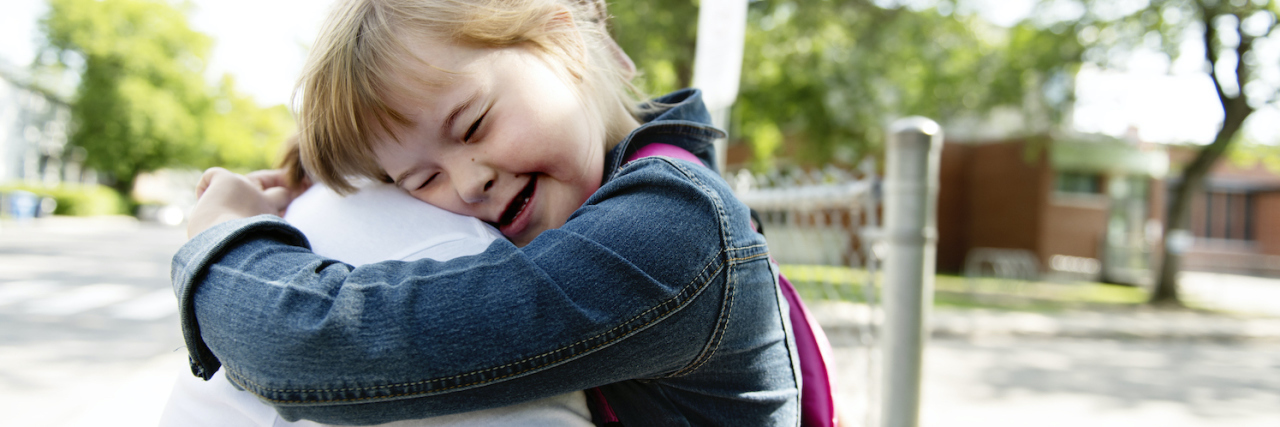15 ‘Harmless' Comments That Actually Hurt Parents of Children With Down Syndrome
“Before you speak ask yourself if what you are going to say is true, is kind, is necessary, is helpful. If the answer is no, maybe what you are about to say should be left unsaid.” — Radio Host Bernard Meltzer.
The above well-known saying has been around over 50 years, and yet too many hurtful comments are made, often unknowingly. Families of children with Down syndrome know this all too well. Callous comments can sting, hurt and scar people far longer than most realize. Some are never forgotten.
Because we could all use this reminder to be kinder to one another, and releasing hurt can be cathartic, we reached out to The Mighty’s community of parents who have children with Down syndrome. We asked them to share “harmless” comments they have heard about their children that actually hurt. Hopefully these answers are yet another reminder of the importance of being kind, advocating for natural inclusion and awareness and looking out for one another.
Here are some “harmless” comments that actually hurt:
1. When people don’t see your family member as a person first.
“My oldest daughter hates when the word Downs is used before the person. She has a sister with Down syndrome, not a Downs sister. She’s her sister first, before anything else.” — Wade S.
“I hate it when people, especially teachers and doctors, call my son a Down syndrome or a Down syndrome boy! Yes, he is a boy. You can call him Aidan. Oh, and he does have Down syndrome.” — Vanessa W.
2. Hearing “functioning” language is defeating and exhausting.
“’Will he be high-functioning?’ Nothing limits his functionality except one’s expectations of him. That’s right — read it again and let it soak on.” — Ron M.
3. Hearing the incorrect “happy” stereotype, again.
“They’re always so happy.’” My little guy gets sad and hurt the same as anyone else. Assuming he’s always happy takes away his humanity.” — Jennifer M.
4. Comments that imply your child was a mistake.
“’Awwww, I’m so sorry.’ With the pity look. I bounce back with a smile and say, ‘Sorry for what? He’s a whole loving little mess just like any other child.’” — Nichole T.
5. Feeling the constant barrier of low expectations.
“Every IEP: School: ‘What’s your goal for your daughter?’ Me: ‘To grow up, be as independent as possible and leave home.’ School: ‘That’s a little unrealistic isn’t it?’ Me: ‘Why? That’s the goal for all my kids. Why should she be different?’ School: Frowns, shaking heads, bewilderment… no understanding.” — Cathy F.
6. Feeling your child is unwanted in this world.
“[People have said,] ‘If I had a child with Down syndrome I’d have to have it adopted. I couldn’t cope.’ Well, don’t have children then.” — Stacey B.
“In a residential center I worked at previously, I was asked why we were bothering moving the people we supported out to the community houses instead of the institution because, ‘All most of them are any good for is breathing.’ It still makes me sick when I think about it.” — Laura B.
7. Comments that make them feel ostracized.
“After I had my son, a friend who was pregnant contacted a mutual friend to see if Down syndrome was contagious. She was afraid her son would get ‘it’ from mine.” — Peggy W.
8. Comments that make them feel segregated.
“My child’s teacher suggested she should be with children that are ‘similar,’ his words not mine, instead of being in a classroom with all children.” — GL M.
9. Comments that make them feel dehumanized in school.
“While trying to hold my son back a grade. I was told by his third grade teacher it didn’t really matter what grade he was in.” — Kristen K.
10. Being treated like a charity case.
“’I don’t know how you do it every day!’ ‘Do what? Love my son? Be a parent to him? Take him out ion public? Teach him? Delight in him? Because you wouldn’t?’” — Stacey B.
“’You’re a saint!’ I have two daughters. I’ve only been called a saint for being the mother of my daughter who has Down syndrome. Being a decent parent does not make you a saint.” — Jessica D.
11. Feeling like your child’s disability is “your fault.”
“I can’t believe you had one of those. You were so clever in school.” — Paula H.
12. Hurtful comments from other children.
“Another child on the playground kept pointing to my daughter on the slide saying, ‘She’s a broken baby,’ over and over. Even after we corrected him. The hard part was his mom was sitting right there playing on her phone and didn’t say anything.” — Alicia B.
13. Hearing your child stereotyped by looks alone.
“They all look the same. Bless them.” — Mary C.
14. Hearing society’s ignorance.
“Maybe she’ll grow out of it.” — Gianna A.
“It’ll go away after his heart surgery.” — Holly H.
15. Feeling like your child is tolerated, not accepted.
“A ‘friend’ once told me, ‘Your son’s little problem doesn’t bother me.’” — Miriam M.
So what should you say? Check out the articles below:
Getty image via LSOphoto

